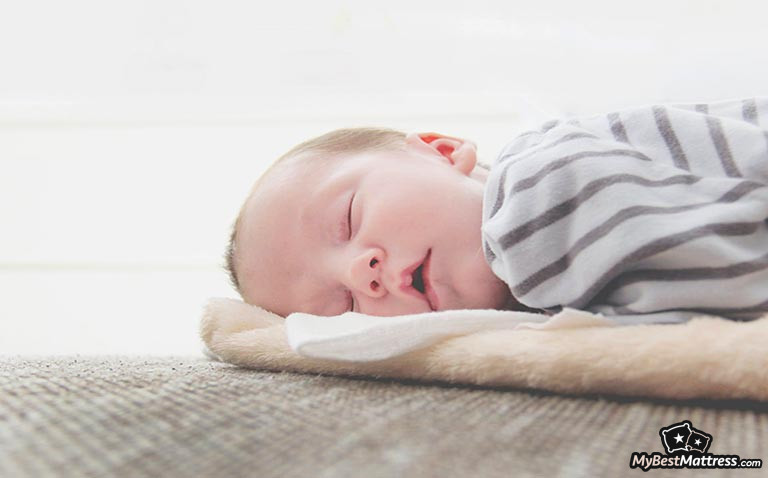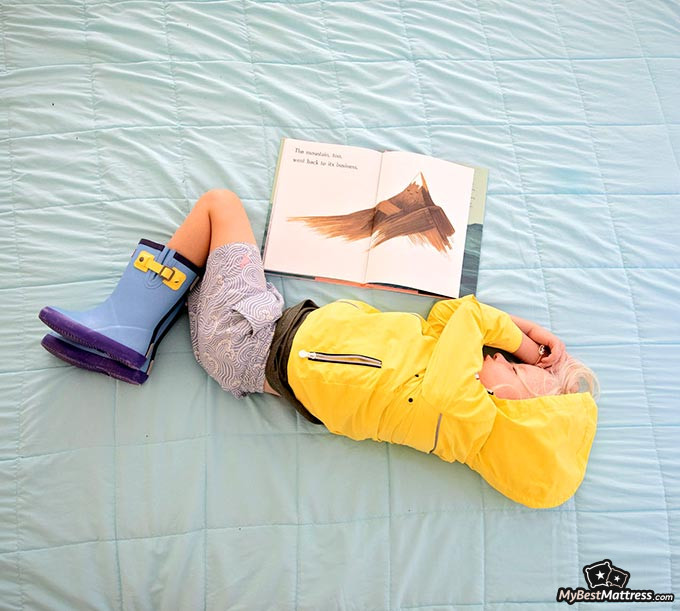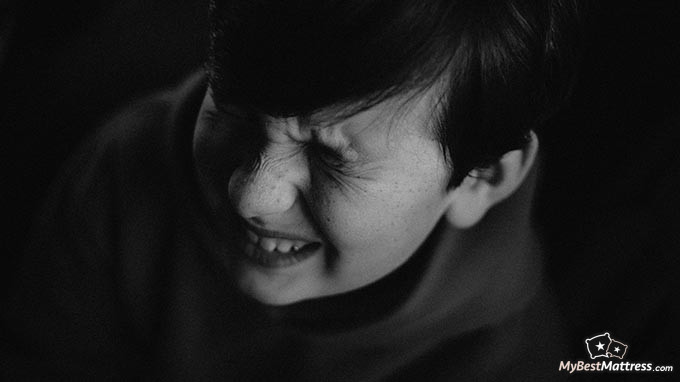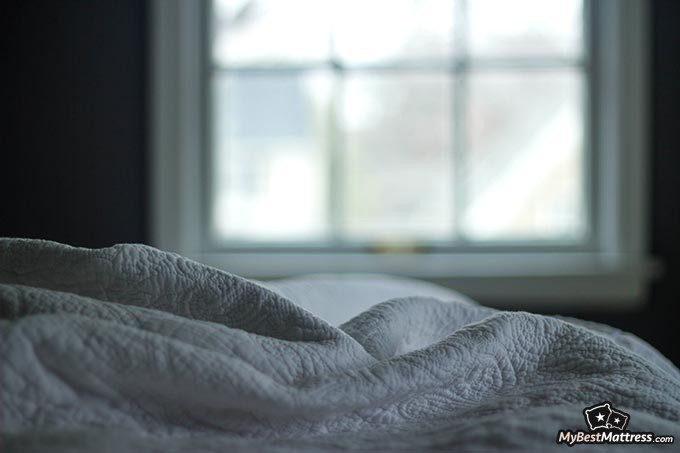
Night terrors in children are something out of a nightmarish scenario for parents. With their instinct to console and protect their children, parents will find it devastating that there is barely anything to do when an episode of night terrors strikes.
So, what are night terrors? What causes night terrors in children?
And no, we do not refer to nightmares. The latter might wake you up in the middle of the night and make you feel slightly uncomfortable.
However, we are talking about a different and potentially more alarming condition that is frequently diagnosed in children (but might affect adults as well).
How can parents help their child if he/she is experiencing night terrors?
The best thing to do is first to see if you can improve your child's sleep by putting them to bed a bit earlier so that they're not going to bed overtired, or helping them take better naps during the day and just keeping your child safe. Making sure that when they do wake up during the night terror, you try not to interfere too much because it can make the situation worse, but just keep them safe and ride it out and know that it will be over before you know it - they will go back to sleep and they won't probably remember it happening in the next day.
Table of Contents
- 1. Defining Night Terrors
- 2. Who Gets Night Terrors?
- 3. Symptoms of Night Terrors
- 4. How to Calm the Child Experiencing Night Terrors?
- 5. Toddlers and Night Terrors: A Frightening Combination
- 6. What Causes Night Terrors in Children?
- 7. Preventing Night Terrors from Happening
- 8. Night Terrors in Children: A Disturbing but Non-Dangerous Condition
Defining Night Terrors
The condition called night terrors is classified among the category of parasomnias (sleep disorders). A more widely known and somewhat similar phenomenon is sleepwalking when people appear to be awake, walk around, perform specific actions, but are not actually fully awake. Night terrors could be mistaken for sleepwalking, but night terrors can be more frightening. Why?
Let’s look deeper into the sheets for answers.
According to Medical News Today, night terrors in children refers to a state of being half-awake in an emotional and agitated state. Another source defines night errors as “an early childhood parasomnia associated with disturbance from non-REM, slow-wave sleep[1].”

During an episode, children might scream, walk around, whisper, make weird noises, cry, show signs of extreme fear, etc. They usually do not respond to their parent’s consolation or words. The child can act as if they do not even see their parents.
In fact, there is not much to be done when the episode of Toddlers and Night Terrors airs.
Children do not respond to any actions around them. One of the options is to wait until it ends when the child simply crawls back into bed and goes to sleep. While night terrors in children are not considered as a major hazard for their health, there are instances when they are symptoms of other sleep disorders.
Remember that it is recommended to let the child settle down. Some might try to soothe their kids, but should not attempt to wake them up intentionally. If parents still try to stop the children’s night terrors while they are happening, the child might wake up confused and disoriented, not remembering what happened. For safety, it is best to let the episode take its course, especially since external disturbances might cause the child to act more violently.
Who Gets Night Terrors?
Anyone can get night terrors. However, this condition is much more common for children. There is no clear evidence suggesting the actual cause for night terrors. Additionally, there is also no guaranteed cure. Usually, one would simply grow out of childrens night terrors when their nervous system matures.
The statistics of night terrors in children range from 3% to 6%. In the majority of cases, kids from 4 to 12 are affected, but there are instances when toddlers experience night terrors as well. However, baby night terrors might be more difficult to diagnose. Babies are bound to cry in the middle of the night, right? Therefore, parents might be unaware that they are facing the symptoms of night terrors.
One important factor is that night terrors in children are potentially inherited from their parents or other close relatives. In fact, about 80% of cases reported that at least one of the family members had night terrors or sleepwalked. This is why, when researching childrens night terrors, you should find out if anyone close had them as well.
Symptoms of Night Terrors
Night terrors usually follow a highly specific pattern. Therefore, it might become easier to recognize a condition due to the repetitive symptoms that affect the child during the night.
For instance, one of the prevalent features of this condition is that the episodes of night terrors start sometime during the early hours of the night. Since children are put to bed earlier, parents might still be awake when the episode strikes. However, there are reports of night terrors occurring during nap time, but this is rarer.

Here are the common symptoms of night terrors in children:
- Suddenly getting up from the bed.
- Night terrors are frequently accompanied by sleepwalking.
- Acting paranoid or scared.
- More intense breathing and a faster heartbeat.
- Screaming or crying.
- Violent movements.
- Sweating.
- Dilated pupils.
- Making weird noises or talking very loudly.
- The child cannot be awakened.
- The child does not respond to comforting techniques.
- The child does not respond to the actions of others.
- The sudden agitated state can last for several minutes. In more extreme cases, the episode can continue for half an hour.
- After the episode ends, the child goes back to sleep.
- In some cases, the episode might occur more than once during the night.
- In the morning, the child has no recollection of what happened.
The symptoms are important to know in hopes of successfully understanding childrens night terrors!
How to Calm the Child Experiencing Night Terrors?
Disrupting the episode of night terrors in children is not recommended. It will be nearly impossible to wake the child up. Even if you manage to do that, the child will wake up disoriented and confused.
What should worried parents do instead? It is reported that they should try to comfort and protect the child in a very subtle way.
- Sometimes children like their hands to be held during an episode.
- Additionally, turn on the light in the room to make the child less scared of the dark.
- One of the main tasks for parents or supervisors is to prevent children from hurting themselves.
- While violently moving around, kids might hurt themselves with objects around them. In some cases, children could fall down the stairs, run into walls, etc.
- Parents can try to soothe their children by reminding them that everything is okay.
- It might be helpful to help the child get back to bed if they are walking around the room in a panicky manner.
- After approximately a few minutes, the child should go back to sleep.
Remember - being subtle is the key here!
Toddlers and Night Terrors: A Frightening Combination
Innocent babies can also be affected by night terrors. Parents nurture their children, especially when they are in such a vulnerable state as an infant. During the first occurrence of night terrors in toddlers, parents might assume that their baby is sick.
The situation becomes even scarier for parents when their infant won’t respond to the practices that usually soothe them. This strange phenomenon occurs because your baby is not yet awake (even though the eyes are wide open).

The symptoms mentioned in the section above all apply for baby night terrors as well. However, it might be more challenging to determine the cause of the nightmarish night you just had since infants have only started to develop a vocabulary.
You won’t be able to ask them whether they remember their rampage. In some cases, parents might simply blame this incident on a restless night and not on a sleeping disorder as the concepts of toddlers and night terrors seem unrelated.
What Causes Night Terrors in Children?
As mentioned, there is no definite proof to suggest that specific factors cause night terrors in children. However, there are reasons to believe that some habits or situations might trigger this condition.
- Stress and exhaustion are possible factors that might be responsible.
- Noisy or unfamiliar environment.
- Some illnesses and medications can cause night terrors.
- Sleeping with a full bladder.
- Medical history of the parents. If close relatives of the child have suffered from night terrors, the child is more likely to develop the same condition. In fact, in about 80% of reported night terrors in children, the condition was inherited.
- According to a study, children who were bullied at school were more likely to start having night terrors[2].
Overall, one of the major factors of what causes night terrors in children is stress. Stressful situations at school, home, or with their friends can trigger the night terrors.
Preventing Night Terrors from Happening
There is no particular treatment for stopping the unpleasant marathon of baby night terrors. Since there is no specific cause to relate to the condition, parents could try out several approaches to make their children sleep more soundly. While these practices won’t cure the disorder, they might help to make children’s night terrors less prevalent.
- You could try to prevent your child from being too tired.
- If you no longer let preschoolers take an afternoon nap, consider returning to this regime if the child starts having episodes of night terrors.
- Do not let your child stay up late.
- In more intense situations, parents can try waking their children up before the night terrors begin.
- Since night terrors in toddlers and older children begin at the early hours of the night, waking them stops the episode from happening in 90% of reported cases.
- Wake your child up 15 minutes before night terrors usually start. Make sure that the child is fully awake. Try to keep them awake for 5 minutes. Repeat this routine for a week and inform the children about what is happening.

- Encourage your child to use the bathroom before going to bed. Sleeping with a full bladder might be a trigger as well.
- Children’s night terrors usually end by the age of 12 or earlier.
- If you are leaving your child with babysitters, make sure you inform them of your child’s condition.
- To a person unfamiliar with night terrors in children, this condition might cause panic and fear for the child’s safety.
- Stick to a regular bedtime regime.
- Doctors might recommend initiating a sleep study for your children. This procedure means that your child will spend a night in a sleep laboratory and have various measurements taken while sleeping.
- Another research lists co-sleeping as one of the possible solutions to night terrors[3]. The researchers suggest that “co-sleeping provides health and safety benefits for developing children.”
Night Terrors in Children: A Disturbing but Non-Dangerous Condition
Yes, not being able to comfort your child during a sudden moment of distress effectively is painful. However, remember that night terrors in toddlers and children are considered normal. They usually grow out of this disorder by the age of 12. Night terrors usually do not have any consequences for the children later on in their lives.

The best advice is to learn to navigate and soothe the child during the episode of night terrors. Protect them from harming themselves and others. If the situation gets out of hand with the night terrors occurring more frequently and violently, do not hesitate to visit the doctor.
Some treatment regimens will help your child become less likely to have another night terror. Stay strong, parents or supervisors, do not panic, and accept night terrors as not a cause for serious concern.
Contributed By Kelly Murray, Certified Pediatric & Adult Sleep Consultant
Kelly Murray is a sleep coach for busy and ambitious professionals who are trying to do it all... if only they could get some sleep.
With her previous professional background in a Big 5 Consul...
Scientific References
Contributed by Kelly Murray, Certified Pediatric & Adult Sleep Consultant1. Sean D Boyden, Martha Pott, and Philip T Starks: 'An evolutionary perspective on night terrors'
2. Wolke D, Lereya ST: 'Bullying and parasomnias: a longitudinal cohort study.'
3. Sean D Boyden, Martha Pott, and Philip T Starks: 'An evolutionary perspective on night terrors'
Leave your honest feedback
Leave your genuine opinion & help thousands of people to choose the best mattress. All feedback, either positive or negative, are accepted as long as they’re honest. We do not publish biased feedback or spam. So if you want to share your experience, opinion or give advice - the scene is yours!















